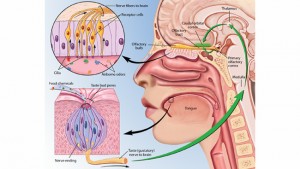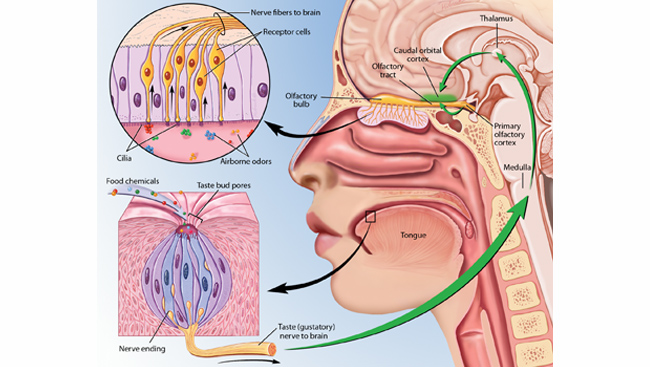 We don’t just rely on our senses of smell and taste to let us fully enjoy the flavors of foods and drinks, or to “smell the roses.” These senses are vital to our basic survival. They help us identify contaminated food, tainted water and help warn of us of dangers such as fire, polluted air, wild animals and poisonous chemicals. In addition, smell and taste play an important part in the management of our health. Here we examine some of the issues we face when our olfactory and taste systems are diminished, and name some of the medications with side-effects that affect these senses.
We don’t just rely on our senses of smell and taste to let us fully enjoy the flavors of foods and drinks, or to “smell the roses.” These senses are vital to our basic survival. They help us identify contaminated food, tainted water and help warn of us of dangers such as fire, polluted air, wild animals and poisonous chemicals. In addition, smell and taste play an important part in the management of our health. Here we examine some of the issues we face when our olfactory and taste systems are diminished, and name some of the medications with side-effects that affect these senses.
What happens when I have trouble with my sense of smell or taste?
If you can’t smell or taste, you will be prone to eating too much. You may gain weight, or you might eat too little you might lose weight. You might use too much sugar and salt to try to make your food taste better. All of this becomes a problem if you have diabetes or high blood pressure.
Is there a difference between taste and flavor?
Yes. The basic tastes are salty, sweet, bitter and sour. “Flavor” involves taste and smell. For example, because a person is able to smell a chocolate bar while eating it, the chocolate not only tastes sweet but also has the flavor of “chocolate.” Chocolate candy might not taste as good if you have a cold and a stuffy nose.
What causes problems with my ability to smell or taste?
Nose or sinus problems might make you lose your sense of smell, for a little while or even a long time. Your sinuses might be swollen or polyps (tiny growths) might block your nose passages.
Infections (like colds or flu) or a head injury might also make you lose your ability to smell. Parkinson’s disease or Alzheimer’s disease can make people lose their sense of smell.
Infection or inflammation in your mouth can cause loss of taste. (Inflammation means redness and swelling.) Head injury and Bell’s palsy can also affect the ability to taste. (Bell’s palsy is an inflammation of the nerves of the face.)
Some medicines (like antibiotics and blood pressure pills) can affect smell and taste. Cigarette smoking, chemicals and a lack of vitamins or minerals (like vitamin B12 and zinc) can also cause problems with taste and smell.
What can I do about this problem?
If a medicine causes the problem, you might ask your doctor if you can stop taking the medicine or take a different medicine. Then you might be able to taste and smell again. If you have an infection or an allergy, treatment might help.
A few people lose the ability to smell or taste forever. But, it’s still possible to improve the appeal of food. Your doctor can give you tips for fixing food in ways that increase your enjoyment.
Selected Medications that Reportedly Alter Smell and Taste
Antibiotics
Ampicillin
Azithromycin (Zithromax)
Ciprofloxacin (Cipro)
Clarithromycin (Biaxin)
Griseofulvin (Grisactin)
Metronidazole (Flagyl)
Ofloxacin (Floxin)
Tetracycline
Anticonvulsants
Carbamazepine (Tegretol)
Phenytoin (Dilantin)
Antidepressants
Amitriptyline (Elavil)
Clomipramine (Anafranil)
Desipramine (Norpramin)
Doxepin (Sinequan)
Imipramine (Tofranil)
Nortriptyline (Pamelor)
Antihistamines and decongestants
Chlorpheniramine
Loratadine (Claritin)
Pseudoephedrine
Antihypertensives and cardiac medications
Acetazolamide (Diamox)
Amiloride (Midamor)
Betaxolol (Betoptic)
Captopril (Capoten)
Diltiazem (Cardizem)
Enalapril (Vasotec)
Hydrochlorothiazide (Esidix) and combinations
Nifedipine (Procardia)
Nitroglycerin
Propranolol (Inderal)
Spironolactone (Aldactone)
Anti-inflammatory agents
Auranofin (Ridaura)
Colchicine
Dexamethasone (Decadron)
Gold (Myochrysine)
Hydrocortisone
Penicillamine (Cuprimine)
Antimanic drug
Lithium
Antineoplastics
Cisplatin (Platinol)
Doxorubicin (Adriamycin
Methotrexate (Rheumatrex)
Vincristine (Oncovin)
Antiparkinsonian agents
Levodopa (Larodopa; with carbidopa: Sinemet)
Antipsychotics
Clozapine (Clozaril)
Trifluoperazine (Stelazine)
Antithyroid agents
Methimazole (Tapazole)
Propylthiouracil
Lipid-lowering agents
Fluvastatin (Lescol)
Lovastatin (Mevacor)
Pravastatin (Pravachol)
Muscle relaxants
Baclofen (Lioresal)
Dantrolene (Dantrium)
Reference:
Effects of drugs on olfaction and taste by STEVEN M. BROMLEY, M.D. of the University of Pennsylvania Smell and Taste Center.
